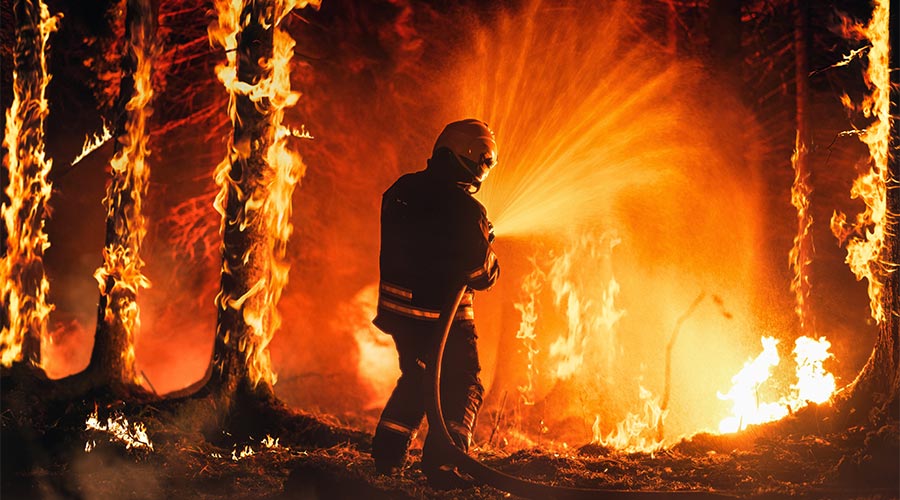
By Ryan Hall, Senior Training Manager at Kitchen Guard
Every October, facility managers across the country are reminded of a sobering truth: fire remains one of the greatest threats to a business's safety, continuity, and reputation. National Fire Prevention Month isn’t just a symbolic designation—it’s a call to action. And for those overseeing commercial kitchens, the stakes couldn’t be higher.
In the heart of any kitchen, grease is both the lifeblood of cooking and one of its most dangerous byproducts. Left unchecked, it clings to hoods, ducts, and fans, forming a hidden fuel source that can ignite with little warning. That risk isn’t hypothetical. This past summer in Yuma, Arizona, a grease fire broke out at a Panda Express kitchen. Thankfully, the suppression system contained it quickly. Still, fire investigators were quick to point out: if the exhaust systems had been dirty or poorly maintained, the outcome could have been devastating. Other facilities haven’t been so fortunate — insurers have paid out millions in damages following kitchen fires traced back to grease-laden ducts and neglected suppression systems.
These incidents underscore the importance of the National Fire Protection Association's standard, specifically NFPA 96, as the national benchmark for ventilation control and fire protection in commercial cooking operations. It’s more than just a set of guidelines — it’s a lifeline. NFPA 96 outlines the design, maintenance, and cleaning requirements for exhaust systems, including the frequency of inspections based on cooking volume. It requires owners not only to keep their systems clean but also to document those cleanings for fire marshals, insurers, and regulators. It is, in short, the playbook for keeping kitchens safe and compliant.
For facility managers, though, compliance isn’t only about safety. It has back-office and bottom-line consequences. Insurers often reward organizations that can demonstrate a strong record of NFPA 96 compliance with lower premiums. On the other hand, claims can be denied outright if a fire is found to be linked to poor maintenance. Regulators, too, are increasingly requiring photo documentation and certified reports to verify that duct systems are being cleaned — not just stickered. And for businesses that depend on customer trust and consistent service, a kitchen fire isn’t simply an operational disruption; it’s a reputational crisis.
That’s why more facilities are turning to professional exhaust-cleaning companies that specialize in NFPA 96 standards. These providers don’t just wipe down visible surfaces — they open access panels, clean deep into ducts, and deliver time-stamped photos and reports that can be presented to insurers and inspectors. The best of them coordinates with fire suppression vendors and mechanical contractors, ensuring every part of the system works together. In doing so, they take much of the burden off facility teams while adding a layer of assurance that goes beyond internal staff cleaning efforts.
The impact ripples outward. Kitchens that maintain clean exhaust systems have better airflow and indoor air quality, which supports employee health and retention. Energy costs often drop because fans and HVAC systems don’t have to strain against grease-clogged ducts. Most importantly, when customers walk into a restaurant or cafeteria, they’re doing so in a safer environment — one less likely to be disrupted by a catastrophic fire.
Fire Prevention Month, then, isn’t just a public campaign; it’s an invitation for facilities to pause, take stock, and recommit to practices that protect both people and property. Reviewing cleaning records, scheduling inspections, and confirming that your service providers are properly certified are simple steps that can make the difference between business as usual and a costly disaster.
For those managing commercial kitchens, October should serve as both a reminder and a motivator. Fires that start in dirty ducts don’t just consume grease — they consume livelihoods. By making NFPA 96 compliance and professional kitchen exhaust cleaning a cornerstone of facility strategy, managers safeguard more than their kitchens. They safeguard their staff, their guests, and the very future of their operations.
Ryan Hall is the Senior Training Manager at Kitchen Guard, a premier commercial hood and kitchen exhaust cleaning service provider with a mission to ensure the highest cleanliness and safety standards in kitchens across various industries, including restaurants, hotels, educational institutions, and more. Ryan has over eight years of experience in the industry and has leveraged that experience to develop a robust training program that covers the technical application of the cleaning process, as well as site/system inspection training for Fire & Life Safety Consultants.
posted on 10/2/2025

 Celebrating BSCAI's 60th Anniversary eBook
Celebrating BSCAI's 60th Anniversary eBook The Down and Dirty on Cleaning in Virus Season
The Down and Dirty on Cleaning in Virus Season How Surfactant Use is Expanding in Commercial Cleaning
How Surfactant Use is Expanding in Commercial Cleaning